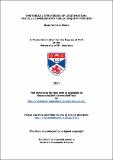Files in this item
Rhetorical strategies of legitimation: the 9/11 Commission's public inquiry process
Item metadata
| dc.contributor.advisor | McKiernan, Peter | |
| dc.contributor.author | Parks, Ryan William | |
| dc.coverage.spatial | 276 | en_US |
| dc.date.accessioned | 2012-03-27T15:46:22Z | |
| dc.date.available | 2012-03-27T15:46:22Z | |
| dc.date.issued | 2011-11-30 | |
| dc.identifier.uri | https://hdl.handle.net/10023/2470 | |
| dc.description.abstract | This research project seeks to explore aspects of the post-reporting phase of the public inquiry process. Central to the public inquiry process is the concept of legitimacy and the idea that a public inquiry provides and opportunity to re-legitimate the credibility of failed public institutions. The current literature asserts that public inquiries re-legitimise through the production of authoritative narratives. As such, most of this scholarship has focused on the production of inquiry reports and, more recently, the reports themselves. However, in an era of accountability, and in the aftermath of such a poignant attack upon society, the production of a report may represent an apogee, but by no means an end, of the re-legitimation process. Appropriately, this thesis examines the post-reporting phase of the 9/11 Commission’s public inquiry process. The 9/11 Commission provides a useful research vehicle due to the bounded, and relatively linear, implementation process of the Commission’s recommendations. In little more than four months a majority of the Commission’s recommendations were passed into law. Within this implementation phase the dominant discursive process took place in the United States Congress. It is the legislative reform debates in the House of Representatives and the Senate that is the focus of this research project. The central research question is: what rhetorical legitimation strategies were employed in the legislative reform debates of the post-reporting phase of the 9/11 Commission’s public inquiry process? This study uses a grounded theory approach to the analysis of the legislative transcripts of the Congressional reform debates. This analysis revealed that proponents employed rhetorical strategies to legitimise a legislative ‘Call to Action’ narrative. Also, they employed rhetorical legitimation strategies that emphasised themes of bipartisanship, hard work and expertise in order to strengthen the standing of the legislation. Opponents of the legislation focused rhetorical de-legitimation strategies on the theme of ‘flawed process’. Finally, nearly all legislators, regardless of their view of the legislation, sought to appropriate the authoritative legitimacy of the Commission, by employing rhetorical strategies that presented their interests and motives as in line with the actions and wishes of the Commission. | en_US |
| dc.language.iso | en | en_US |
| dc.publisher | University of St Andrews | |
| dc.rights | Creative Commons Attribution-NonCommercial-NoDerivs 3.0 Unported | |
| dc.rights.uri | http://creativecommons.org/licenses/by-nc-nd/3.0/ | |
| dc.subject | Legitimacy | en_US |
| dc.subject | Public inquiries | en_US |
| dc.subject | 9/11 Commission | en_US |
| dc.subject | US congressional debate | en_US |
| dc.subject | Rhetoric | en_US |
| dc.subject.lcc | K3321.P2 | |
| dc.subject.lcsh | Governmental investigations | en_US |
| dc.subject.lcsh | Rhetoric--Political aspects | en_US |
| dc.subject.lcsh | National Commission on Terrorist Attacks upon the United States. 9/11 Commission report. | en_US |
| dc.subject.lcsh | United States. Congress. House. Committee on Government Reform | en_US |
| dc.title | Rhetorical strategies of legitimation: the 9/11 Commission's public inquiry process | en_US |
| dc.type | Thesis | en_US |
| dc.type.qualificationlevel | Doctoral | en_US |
| dc.type.qualificationname | PhD Doctor of Philosophy | en_US |
| dc.publisher.institution | The University of St Andrews | en_US |
This item appears in the following Collection(s)
Except where otherwise noted within the work, this item's licence for re-use is described as Creative Commons Attribution-NonCommercial-NoDerivs 3.0 Unported
Items in the St Andrews Research Repository are protected by copyright, with all rights reserved, unless otherwise indicated.


